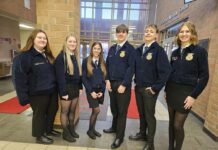“They are mostly good people who have had bad luck,” said my grandmother in the late 1930s, explaining why there were men referred to as a “hobo” or a “bum” who traveled by bumming a ride on a railroad car.
My mother grew up not far from a country railroad crossing, and throughout her childhood, the appearance of a hobo at their door was commonplace. Although she recalls being warned to not walk alone down by the tracks, it held no great focus.
“We never felt fearful of the bums who would come up to the house, after knocking on other doors, asking if they could do any work for a little food,” my mother told me recently.
Sharing
Because they had a small barn, an orchard and a few head of livestock, her father would nearly always find a small job he needed help completing. Though money was not plentiful, her parents found food to share with the railroad travelers.
“Often, Dad would sit outside with a cup of coffee and talk with a fellow while giving him a potato or a bowl of stew. Many of them had interesting life stories, and were hoping to find work in a new area of the country after hitting on hard times back home,” Mom tells me.
Her memories of those days are clear and sharp, and she insists she never feared these strangers.
“We were taught to be respectful, to never invite a stranger into the house, but to be willing to share what we could,” she said.
All my life, I remember the Myers water pump, painted green, that stood in the well-manicured side yard at my grandparents’ home. It was often a welcome sight for the thirsty travelers, and Mom said her father would sometimes offer soap and a cloth to those hobos who obviously needed refreshing under the water flow.
Grandparents
Many times I have wished I could talk to my grandparents again. My grandfather, a calm, sweet man, died when I was 15, and my grandmother passed away just after my youngest was born.
Born near the turn of the century, neither had an easy childhood. My grandmother was the fourth born in a family with 14 siblings, and they moved often as her father sought a rental home on farms where he could help with work. My grandfather and his brothers ended up “farmed out” as young boys, living with people who needed help in exchange for a bed and meals.
“No one had much, but people pulled together back then,” Mom explains.
Hearts open
My grandfather grew to admire the folks he lived with and considered them his family. There was surely heartache in all of these stories, but there was not the stigma attached to the struggles as there is in today’s world.
“People stepped in to help wherever they could, with empathy instead of judgment,” my mother said.
I realize this is how my parents continued to view their community throughout their own lives. What a gift to have been raised by such good people, with hearts open to others.












